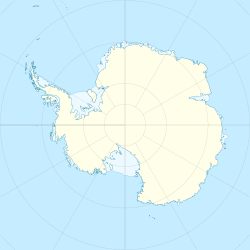Henkes Islands facts for kids
|
Location in Antarctica
|
|
| Geography | |
|---|---|
| Location | Antarctica |
| Coordinates | 67°48′S 68°56′W / 67.800°S 68.933°W |
| Administration | |
| Administered under the Antarctic Treaty System | |
| Demographics | |
| Population | Uninhabited |
The Henkes Islands are a small group of islands and rocks in Antarctica. They stretch for about 2 kilometers (1.2 miles). These islands are located very close to the southern end of Adelaide Island. They lie about 2 kilometers (1 nautical mile) southwest of Avian Island.
Contents
Discovering the Henkes Islands
The Henkes Islands were first found by the French Antarctic Expedition, 1908–10. This expedition was led by a famous explorer named Jean-Baptiste Charcot. He discovered the islands between 1908 and 1910.
How the Islands Got Their Name
Jean-Baptiste Charcot named these islands after someone important. He named them for one of the Dutch directors of the Magellan Whaling Company. This company was located in Punta Arenas.
At first, Charcot used the name "Henkes" for many scattered rocks. These rocks were found between Cape Adriasola and Cape Alexandra. Later, the name was made more specific. The UK Antarctic Place-Names Committee (UKAPC) officially limited the name. They decided it would only refer to the group of islands we know today. This happened after detailed maps were made. The British Antarctic Survey (BAS) mapped the area in 1961. The British Royal Navy Hydrographic Survey (BRNHS) also mapped it in 1963. All the smaller islands within this group were named by the UKAPC.
Important Islands in the Group
Several smaller islands and rocks make up the Henkes Islands. Each of them has its own name and story.
Worth Reef
Worth Reef is a curved line of rocks. It forms the northernmost part of the Henkes Islands. These rocks were named after Acting Corporal David A. Worth. He was part of the BRNHS team.
Biggs Island
Biggs Island is the easternmost island in the Henkes group. It is actually a small island. It was named after Thomas Biggs. He was a Falkland Islander. Thomas Biggs was the coxswain (boat operator) of the launch from the ship RRS John Biscoe. This launch was used by the BRNHS to map Biggs Island in 1963.
Dean Rocks
Between Biggs Island and Preston Island, there are four rocks. These rocks are known together as the Dean Rocks. They were named after Engineer Mechanic Thomas Dean. He was also a member of the BRNHS team.
Preston Island
Preston Island is the largest island in the Henkes group. It was named for Frank Preston. He was an officer for the BAS. Frank Preston was in charge of the Adelaide station.
Crouch Island
Crouch Island is the second largest island in the group. The BRNHS surveyed it in 1963. It was named after Alan Crouch. He was a general assistant for the BAS at the Adelaide station. Both Frank Preston and Alan Crouch were part of the first group of people to spend a winter at the Adelaide station. This was during 1961–62.


